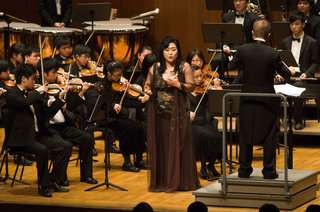|
Back
An Evening of Joy and Excitement Hong Kong
Hong Kong City Hall Concert Hall
04/06/2010 -
George Frideric Handel: Overture & “Rejoice, greatly, O Daughter of Zion” from Messiah (Version arranged by Mozart)
Richard Strauss: Morgen, Op. 27 No. 4 – Cäcillie, Op. 27 No. 2
Giuseppe Verdi: “Pace, pace, mio Dio!” from La Forza del Destino
Gustav Mahler: Symphony No. 4 in G major
In-Hye Kim (soprano)
Pro Arte Orchestra of Hong Kong, Ho-Man Choi (Music Director/Conductor) 
I.-H. Kim and the Pro Arte Orchestra of Hong Kong
Although the Pro Arte Orchestra of Hong Kong (PAOHK) has held numerous concerts in the past few years, Tuesday evening was the first time I attended their event. What attracted me to the concert hall was Mahler’s 4th Symphony on the program. It is a piece widely performed in Hong Kong, and perhaps the most frequently performed Mahler symphony in recent year - past performances include those by the Hong Kong Philharmonic, Hong Kong Sinfonietta, and the Asian Youth Orchestra. This piece is of the smallest scale amongst Mahler’s orchestral works, but for a youth orchestra (or more precisely, an adolescent orchestra), the technical demand and musical profundity are the immense challenges the young people have to overcome.
The presence of the leading Korean soprano In-Hye Kim brought extra excitement to the already surprising evening. She showed off her glittering tone in the Cäcilie and “Pace, pace, mio Dio!”, with her voice luxuriating in the shape of every ecstatic phrase of the two pieces. Her vehement readings, together with her ostentatious facial expression and body language, were a truly entertaining drama, particularly for the Verdi. The supple and feminine side of her temperament tellingly exemplified the lyrics of Morgen as a love poem, which Strauss dedicated to his wife as a wedding present. However, the intricate harmonic colors, somehow too profound for the youngsters, were a little lackluster.
Mahler’s 4th Symphony in the second half was no doubt a stunning interpretation. The youngish musicians were able to execute the score with accuracy, discipline, and most importantly, a unified tone. Unlike most student orchestras which tend to rush the music unceremoniously, especially at slow movements, PAOHK’s account of this massive work was a steady and sluggish one, though sometimes the extreme slow tempo adopted by Mr. Choi compromised the music’s ebb and flow. Notwithstanding, there was technical security from the players throughout – violins were with pitch accuracy at high registers, horns played with a stable intonation, and the glissandi and pizzicati of cellos were carefully synchronized. The outcome fully reflected their effort and endeavor to deliver a high quality performance to the audience. What was particularly impressive to me was the performance of the oboe player whose rendition combined noble and warm tones. The precision and leadership of the timpani was also highly commendable. On the other hand, Ms. Kim’s over-expressive voice in the last movement somewhat came across as a scarification of the innocence and simplicity of the heavenly song. It seems that she is more suitable for opera than this kind of introversive and emotionally inhibited lieder.
For encore, the PAOHK and Ms. Kim once again rendered Strauss’s Caecilie, a piece in which both of them felt confident and comfortable. The overwhelmingly enthusiastic ovation by the audience was the best reward to the hard work of these young musicians. As a three-year-old orchestra, with most of the players not more than 25 years of age, the PAOHK has enormous room for improvement. Their professional attitude towards performance, and passionate zeal for music are exemplary models for music students and musicians in Hong Kong, even for some of those from the two professional orchestras!
Pro Arte Orchestra of Hong Kong’s website
Danny Kim-Nam Hui
|